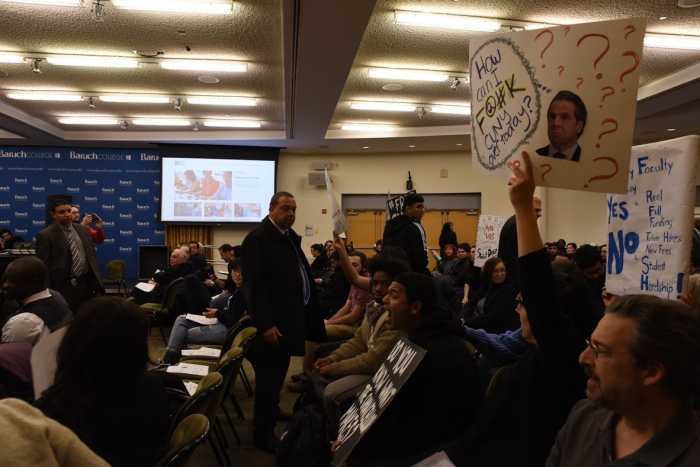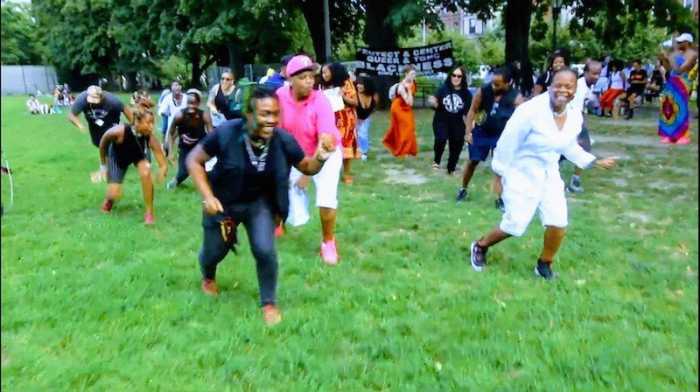by Matt Tracy
The State Legislature on February 2 overwhelmingly passed a much-anticipated bipartisan bill repealing a discriminatory loitering law known as a ban on “walking while trans,” capping off a years-long advocacy effort driven in large part by those who have been victimized under the measure.
The State Senate approved the bill by a 45-16 margin before the Assembly stepped up and passed it, 105-44. Governor Andrew Cuomo, who endorsed the bill, signed it into law the same day.
The archaic loitering law, Section 240.37 of the New York State Penal Code, has been used by police officers to harass and arrest transgender women of color for baseless reasons, including what they are wearing or whether or not they have an “Adam’s Apple.” Many people have reported being stopped for merely walking down the street.
Notably, the new legislation also amends Section 160.50 of the criminal procedure law to seal prior convictions under the loitering law. The “walking while trans” ban has historically presented roadblocks for those seeking housing, employment, and more.
Frustratingly, it took years of advocacy — including numerous press conferences, rallies, letters, outreach, and even resolutions in the New York City Council — before lawmakers would even budge on moving the legislation forward. The repeal bill reached the Assembly floor in 2019 without a vote and then stalled in the Senate Codes Committee. By 2020, advocates were demanding answers from Assembly Speaker Carl Heastie and State Senate Majority Leader Andrea Stewart-Cousins about why the bill continued to collect dust.
Out gay State Senator Brad Hoylman of Manhattan and Assemblymember Amy Paulin of Westchester, who are the bill’s lead sponsors, worked with advocates to continue rallying the support they needed from other lawmakers. In June of last year, the State Senate clinched the necessary co-sponsors to pass the bill with their votes alone — and the support only grew from there.
“The Senate today corrects an injustice in our penal code that has permitted law enforcement to arrest transgender women — namely those of color, along with immigrants and LGBTQ youth — simply for walking down the street and the clothes they wear,” Hoylman said in a written statement after the bill passed the upper chamber. “This outdated, discriminatory statute has led to hundreds of unnecessary arrests of transgender women of color and a broader culture of fear and intimidation for transgender and gender non-conforming New Yorkers.”
Hoylman’s newest out gay colleague, State Senator Jabari Brisport, reacted to the bill’s passage by noting that the state has made significant strides on LGBTQ rights in a short span of time.
“Twelve years ago the New York State Senate voted no on same sex marriage,” Brisport said in a tweet. “Today we just voted to repeal Walking While Trans. How far we’ve come. Queer rights are human rights and Black Trans Lives Matter.”
Assemblymembers sparred over the bill during a debate on the Assembly floor February 2, but some GOP lawmakers veered far off track as they pushed a series of unsubstantiated points warning of a sex trafficking surge if the law is repealed. Republicans even used the opportunity to argue that the repeal would lead to the comprehensive decriminalization of sex work. A sex work decriminalization bill was proposed in the State Legislature in 2019.
Assemblymember Michael Reilly of Staten Island argued that repealing the law would lead to a proliferation of “red light districts” and “bring carjacking,” while Assemblymember Joseph Angelino, who represents the upstate area of Norwich, suggested that lawmakers could simply contact law enforcement officials and “have them modify their behavior.” Assemblymember Michael Tannousis of Brooklyn and Staten Island voiced a similar point, saying that “this should be corrected by addressing the potential unjust enforcement of this law, not repealing this law totally.”
Contrary to that argument, however, the NYPD already amended its patrol guide to advise officers against utilizing the loitering law — and that has not stopped officers from harassing sex workers and trans women.
Tannousis added, “My fear is that by repealing this law, we will embolden the gangs and organized crime groups” who engage in sex trafficking.
The talking points pushed by Republicans directly contradicted the realities of sex workers who have long stressed that policing and criminalization must be reduced to bolster safety and eradicate sex trafficking. Advocates have repeatedly drilled the point that under current laws, sex trafficking victims are less likely to seek help out of fear that they could be locked up, face unnecessary penalties, or become the subject of police abuse. Sex workers who are undocumented immigrants face further marginalization because any interaction with policing could put them at risk for deportation.
TS Candii, an advocate who has been the most prominent voice in the movement to pass the repeal bill, spoke at a press conference earlier in the day during which she recalled her own experience getting targeted under the law.
“Two years ago when I moved to New York City, an NYPD officer used penal law 240.37 to profile and force me to perform sexual acts,” TS Candii said. “Thankfully, I wasn’t arrested, but to this day the trauma is still very real for me. In this moment, I can’t help but to think about my siblings, Lorena Borjas’ story, Bianey [Garcia’s] story, and countless of Black and Brown cis women and TGNC people who were arrested, incarcerated, and traumatized over the past 44 years because of this law… So today, to say that I’m just happy that this law will finally be repealed and records will be sealed, is an understatement.”
Garcia, who also recently testified at a City Council hearing about the time she was targeted by the loitering law, also invoked Borjas — the late Queens-based trans activist and community leader who died of COVID-19 last March — when she posted on social media before lawmakers voted to strike the law from the books.
Others who spoke at the press conference hosted by TS Candii and Make the Road New York also acknowledged the significance of the bill’s passage. Jared Trujillo, an attorney and former sex worker who has been part of the core group of activists driving the legislation, noted that the loitering law is “a direct descendent” of Jim Crow-era laws that sought to lock up Black and Brown individuals simply for existing. He also, however, reminded everyone that the fight for justice for transgender Americans is far from over.
“Forty-seven percent of Black trans women are incarcerated at some point in their lives,” he said. “I want to acknowledge that 40 percent of homeless youth are queer and trans because of how this country treats folks. I want to remind folks that we still have really inhumane solitary practices which are fatal consequences. Today is a day that everyone should be proud of. Today is the day that trans Black and Brown folks should be proud of, because this is your labor, your emotional fight.”
State Senator Jessica Ramos of Queens, who was among the lawmakers who first spearheaded a comprehensive sex work decriminalization bill in 2019, opened up during the press conference about her own story getting stopped and frisked on Roosevelt Avenue and 76th Street in Queens several years ago.
“That experience opened my eyes to grave injustices committed against our sex workers and particularly trans women and trans women of color,” Ramos said. “I feel proud to cast my vote today to support my neighbors.”
After signing the bill into law, Cuomo said the now-nixed policy represented an “example of the ugly undercurrents of injustices that transgender New Yorkers — especially those of color — face simply for walking down the street.”
“For too long trans people have been unfairly targeted and disproportionately policed for innocent, lawful conduct based solely on their appearance,” Cuomo said in a written statement. “Repealing the archaic ‘walking while trans’ ban is a critical step toward reforming our policing system and reducing the harassment and criminalization transgender people face simply for being themselves. New York has always led the nation on LGBTQ rights, and we will continue that fight until we achieve true equality for all.”
[This story was originally posted on Gay City News.]


![State Senator Brad Hoylman [photo provided by Avi Small]](https://politicsny.com/wp-content/uploads/2021/02/IMG-6226-1-e1589989850259.png?quality=51&w=665)







